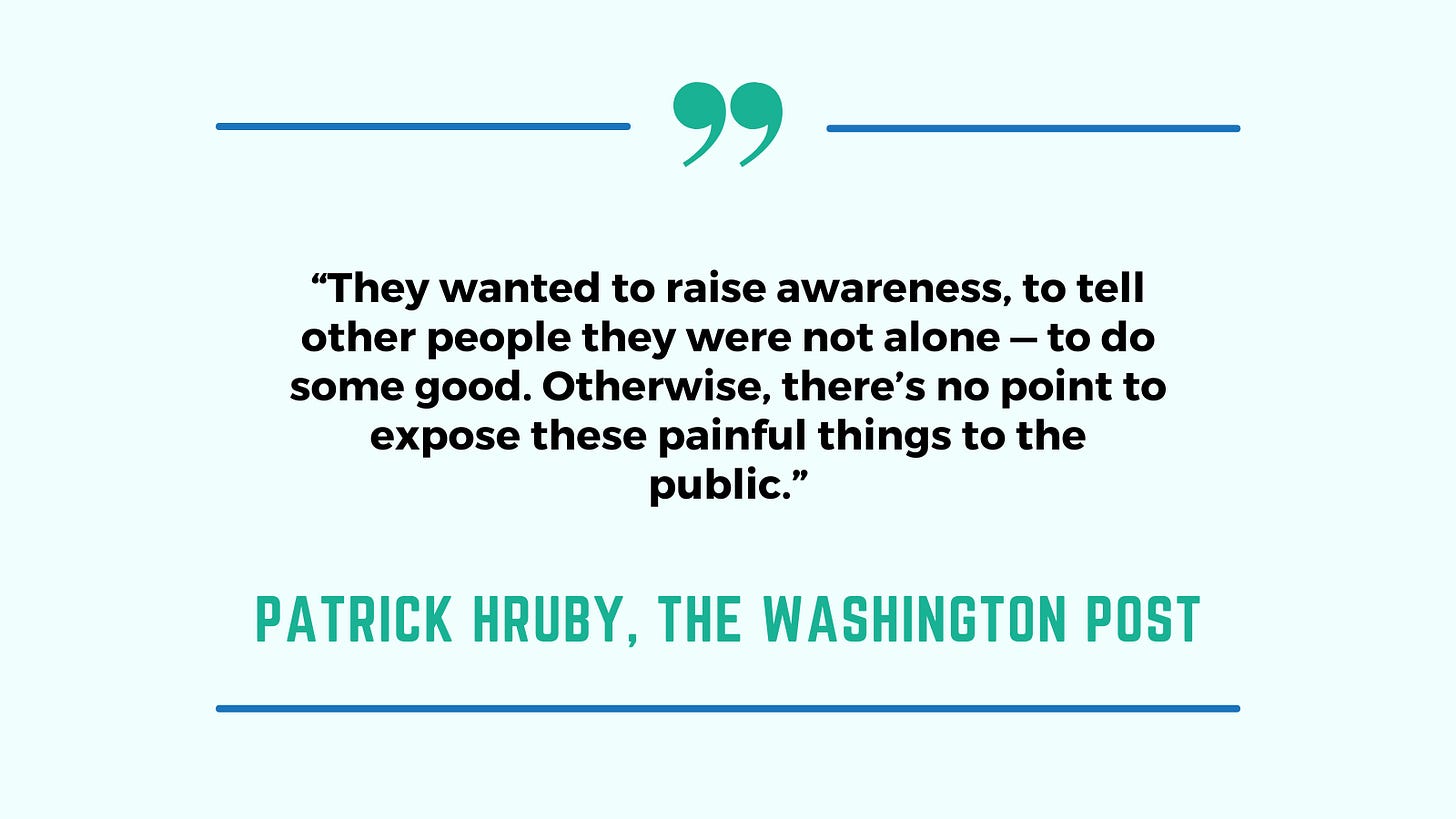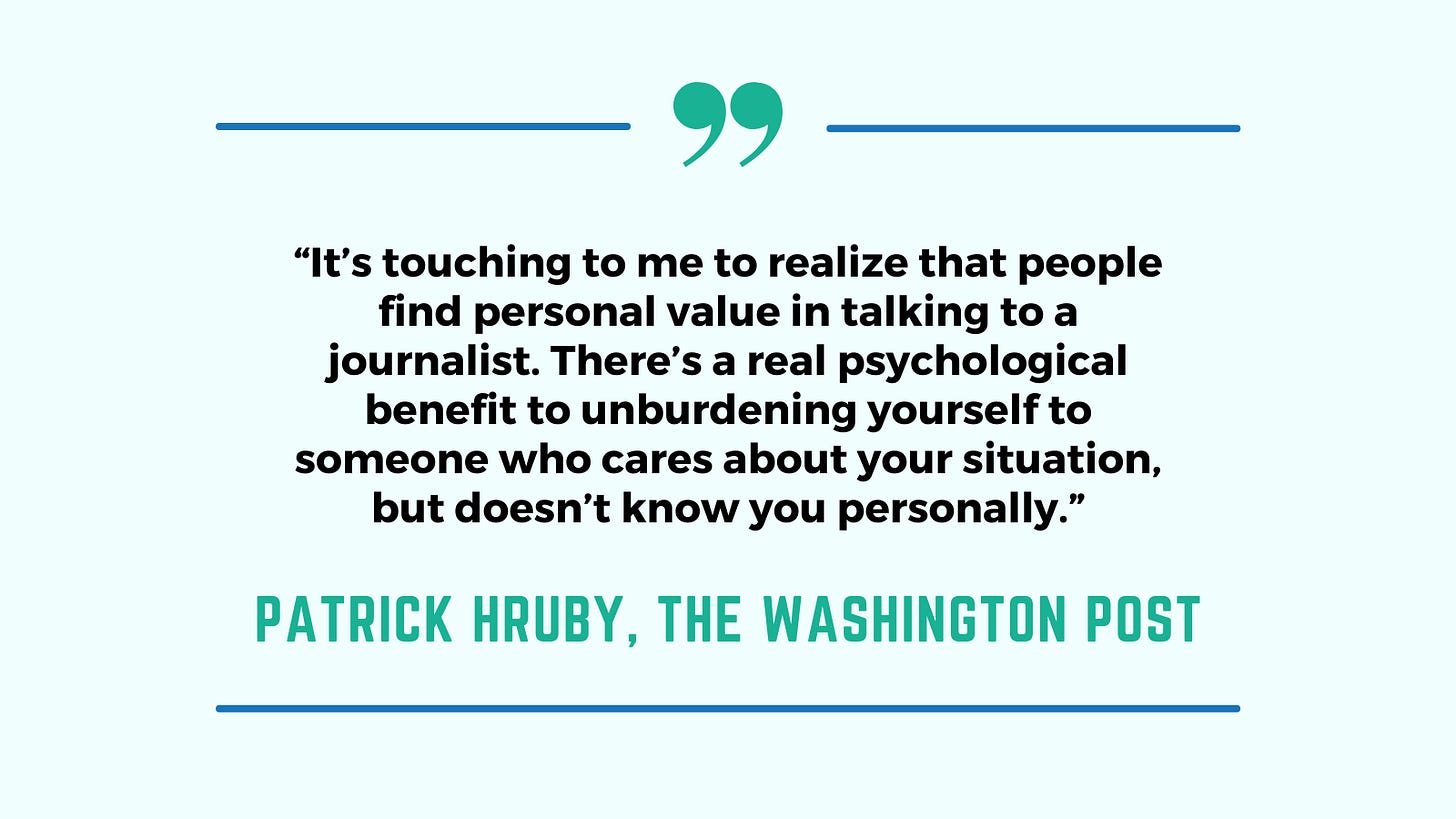Stories that Matter: How The Washington Post Magazine Revealed the Link Between 9/11 and Dementia
Patrick Hruby discovered that a disproportionate number of 9/11 first responders are suffering in mid-life from cognitive disorders usually seen in old age.

Patrick Hruby writes primarily about sports. That makes him an unlikely candidate to author a disturbing story about 9/11 first responders. Yet it was Hruby who recently revealed that the health problems of many firefighters, cops and others who worked at the site of the fallen World Trade Center are not limited to their lungs, or even to an increased likelihood of various cancers.
As he uncovers in a gripping feature in The Washington Post Magazine, a startling number of these heroes, who are now in their 50s, are suffering from dementia and other types of cognitive impairment far more common to people in their 70s or 80s. For many, it seems, the physical and psychological toll of that grim work has been long-lasting — and, for some, devastating.
We talked with Hruby, who has previously worked for ESPN and Vice, about how he found this previously untold story, and how his experiences as a sportswriter actually made him the perfect person to tell it. The interview has been edited for concision and clarity.
How did a sportswriter come to write about 9/11 first responders?
Hruby: I have written many stories about former football players with dementia and other cognitive issues. I’ve spent time with their families. As a reporter, this makes it easier to connect with people — to understand what they’re going through, to know what questions to ask when you talk to them.
That experience also helped build trust. When you’re writing about people who have dementia, or brain injuries, that’s important. It’s an extremely difficult thing to live with, both for the people suffering from the injury, and for the people around them.
So how specifically did you come across this story?
Hruby: I had been working on a piece The Washington Post Magazine published last fall. It was about scientists who are attempting to come up with ways to detect BTE, the repetitive brain-trauma disease that has been linked to boxing and other sports. Right now, they can only detect it for certain once you’re dead.
As I was doing that story, one of the scientists working on that research, Sam Gandy, mentioned to me the 9/11 first responders. He works at Mount Sinai in New York; he has done a lot of Alzheimer’s work throughout his career. He told me they were starting to see these same things we see in football players in first responders. That sounded like a story.
He connected me to the main researchers who are looking at the 9/11 first responders. These researchers have been publishing studies in academic journals about this for a couple of years, but outside of a couple of relatively obscure science websites, and a couple of small stories in the New York Post and New York Daily News, there was nothing out there on this.
What was your initial reaction to this information?
Hruby: I was really shocked. A lot of us know the 9/11 first responders have had a lot of health problems over the years. The fight over federal funding for care, which Jon Stewart got involved with, was heavily publicized — rightfully so. Through that, I think a lot of us learned that they’re suffering from lung conditions, and were starting to have cancers and other weird diseases (at disproportionate rates). But almost no one had written about brain conditions. I thought there was an important story to tell here — and since I have experience telling this type of story, I’m going to tell it.
Since cognitive problems weren’t on anyone’s radar, how did the researchers come to study this issue?
Hruby: They weren’t expecting to find anything drastic. The idea was they would measure baseline levels of mental functioning, which would allow them to accurately measure the decline if problems developed over time. What shocked them was when they tested these people, who were then in their 50s, the percentage of them that already had something wrong was much higher than expected.
It’s not that every single responder was having these problems, or that all of these problems are super obvious. They can be as simple as you’re driving around and you can’t remember how to get home. But you’re seeing it at a much higher rate than you would expect otherwise. That’s also true of football players.
How did you get in contact with first responders who were suffering from these problems, or members of their families? Were they reluctant to talk?
Hruby: I went through the researchers. These clinics both study the responders and provide care. There’s a good, trusting relationship between some of the research coordinators at this Long Island clinic and some of the first responders. They were very good about putting together a group of responders who were willing to talk to me. Most of the interviews were done at the clinic (part of Stony Brook University’s WTC Health and Wellness Program), which was really helpful. It’s a difficult thing to share about this, but they felt safe there.
Most of the people I talked to were firefighters and cops. Some were there that day, some came in that night, some the next day. Some were there for months, others for lesser amounts of time. Some had pretty severe cognitive impairment, some not so much. Almost all of them had other health conditions as well.
I met the couple I focused on in the story, Ron and Dawn Kirchner, separately through one of the researchers. They wanted to raise awareness, to tell other people they were not alone — to do some good. Otherwise, there’s no point to expose these painful things to the public.
How did you approach this tough topic when you interviewed them?
Hruby: I tried to let people just talk. I had lots of things I want to ask them about, but I mainly wanted them to tell me what’s important to them. This worked really well. It’s touching to me to realize that people find personal value in talking to a journalist. There’s a real psychological benefit to unburdening yourself to someone who cares about your situation, but doesn’t know you personally. I’m not a therapist, but I’m happy that I can be there for them in that way.
As a writer, was your goal to get out of the way and tell the story simply and clearly?
Hruby: Yes. The cliché about showing, not telling, is totally true. The science part of this is pretty compelling. If the scientists are shocked, the average reader is probably also going to be shocked. What matters is to put it into plain English, and pull out what matters to the general reader. That’s an art in itself.
I feel like I’m a translator. How can I translate these findings so that they make sense to the average person? My job is not to tell you how to feel about all this. If you’re not a psychopath, I know how you’re going to feel. I know how I felt reporting about it, but I don’t need to share that. The story, the images — they speak for themselves. Me trying to make a statement would take away from that.
It’s kind of a gut punch when, after you go into great detail about Ron Kirchner’s mental deterioration, you hit us with his age: 51.
Hruby: It’s like how a magic trick works. What are you going to show the audience, and when are you going to show it? I’m not writing a murder mystery, but you want to have some level of suspense, so the story carries you through — especially a story like this, which has so much scientific information.
It has to be logically organized so you can follow it. What you learn in section one helps you understand section three. You have to be conscious of that, but you also want the details to be revealed in a way that has the most power. The construction of how that unfolds takes a lot of thought, and a lot of work. So it’s not about writing beautiful sentences. The story doesn’t need that.
Does the fact this subject has gotten so little coverage to date reflect our society’s tendency to avoid dealing with mental-health issues?
Hruby: Absolutely. Even though we’ve come a long way, there’s still a lot of stigma around mental-health stuff. People have a tough time talking about it. The fact it’s connected to 9/11 is also a factor. That was an enormously traumatic event. People don’t always want to relive trauma; often, they want to forget it. I understand that myself. When you put those two things together, you can see why people don’t necessarily want to talk about it, or read about it, or write about it.
Stories That Matter is a series of interviews with the people behind some of the best and most influential journalism being done today, focused on reporting, writing, and lessons we can learn from the process of creating great work.
The Postscript
Additional content and context, added to everything we do.
Predict: What Happens Next?
Patrick Hruby has gotten thank you notes from other first responders and their families, who express appreciation at him bringing up this issue. He has yet to hear from anyone in government, however, so don’t expect any public hearings on this issue any time soon. The research is continuing.
“I hope more people become aware of this issue (thanks to the article),” he says. “That could mean more money for more research. Knowing about a problem is the first step toward solving it. As journalists, that’s the best thing we can do.”
Read: More on Cognitive Impairment
This article, published in an academic journal in January, takes an in-depth look into the issue of mental impairment among 9/11 first responders: “A Workshop on Cognitive Aging and Impairment in the 9/11-Exposed Population,” January 14, 2021
Patrick Hruby’s expose on concussions, football players, and mental disorders, also from The Washington Post Magazine: “Damage Assessment,” September 2, 2020
A 2020 study found that suffering from post-traumatic stress disorder may double the likelihood a person suffers from dementia later in life: “PTSD May Double Risk of Dementia,” September 15, 2020
Meet: About the Author
Tom Jacobs is a former senior staff writer for Santa Barbara-based Pacific Standard magazine, and a former staff writer for the Los Angeles Daily News and the Santa Barbara News-Press. He tracks and analyzes trends in the arts and social sciences, with an emphasis on psychology, the role of culture, and the cultivation of creativity. A native of Chicago, he earned bachelor’s and master’s degrees in journalism from Northwestern University.



